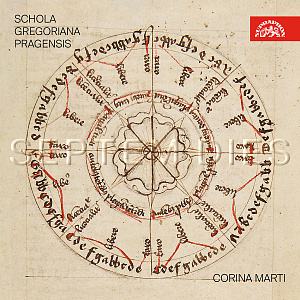
SCHOLA GREGORIANA PRAGENSIS’S ALBUM SEPTEM DIES
MUSIC PLAYED AT THE PRAGUE UNIVERSITY IN THE MID-15TH CENTURY


The internationally renowned ensemble Schola Gregoriana Pragensis and the Swiss clavisimbalist Corina Marti, conducted by David Eben, have made an album containing the music performed at the Prague university according to mid-15th-century sources, following the Hussite wars and the institution’s renovation. Titled Septem dies, the new recording will be released by Supraphon on 11 June 2021. It presents a wide array of liturgical music, sacred pieces by young clerics, as well as music the university students played for entertainment. The album includes Gregorian chant, anonymous creations and compositions by Bernard de Cluny, Petrus Wilhelmi de Grudencz and Antonio da Cividale.
Contemporary university students would be hard pressed to imagine life without social networking on their smartphones. In the 15th century, the role of social networking was played by communal singing, bringing the students together and being part of their everyday life. The foundation charter of Reček College of the Prague university (1438) stipulated for the students the duty to perform music every day within the liturgical services. On the other hand, secular music, including instrumental and dance, was prohibited (especially playing resonant instruments, singing in the vernacular languages and ribald songs), but the students constantly bent the rules. The liturgy prescribed for each day of the week served as the basis for the repertoire of the present recording, which, however, also affords scope to the secular music that in all likelihood the students used to play during their leisure time beyond the walls of the college. “The album shows that in the 14th and 15th centuries music was an integral part of student life. The repertoire and the selected pieces are truly authentic, based on the local historical and music sources,” said Jan Ciglbauer from the Institute of Musicology of the Faculty of Arts of Charles University, the author of the extensive essay in the booklet. David Eben, the artistic director of Schola Gregoriana Pragensis, said: “I confess that the album is a heartfelt matter for me. One of the project’s aims is to communicate the fact that the students at the Prague university were singing every day, which I don’t think is generally known. The students and their teachers also constituted a religious community, performing liturgical pieces and chants. In addition, they held informal gatherings, at which they most likely indulged in secular music.”
The unique album made by Schola Gregoriana Pragensis and their very special guest, the clavisimbalist Corina Marti (La Morra), is being released along with an extensive study providing a comprehensive mapping of 15th-century university music life. The fruit of the collaboration between musicians and musicologists from across Europe is a book with a CD, an artefact that will become a natural part of the library of every connoisseur and lover of medieval music. “We decided to conceive the new album in a different way, not like a mere ‚ordinary‘ CD. The project comprises two full-fledged products – the recording itself and an extensive accompanying text, a book that affords a comprehensive summary of the music and its historical background. Accordingly, it is a collective work, the result of co-operation between our ensemble and musicologists,” David Eben added.